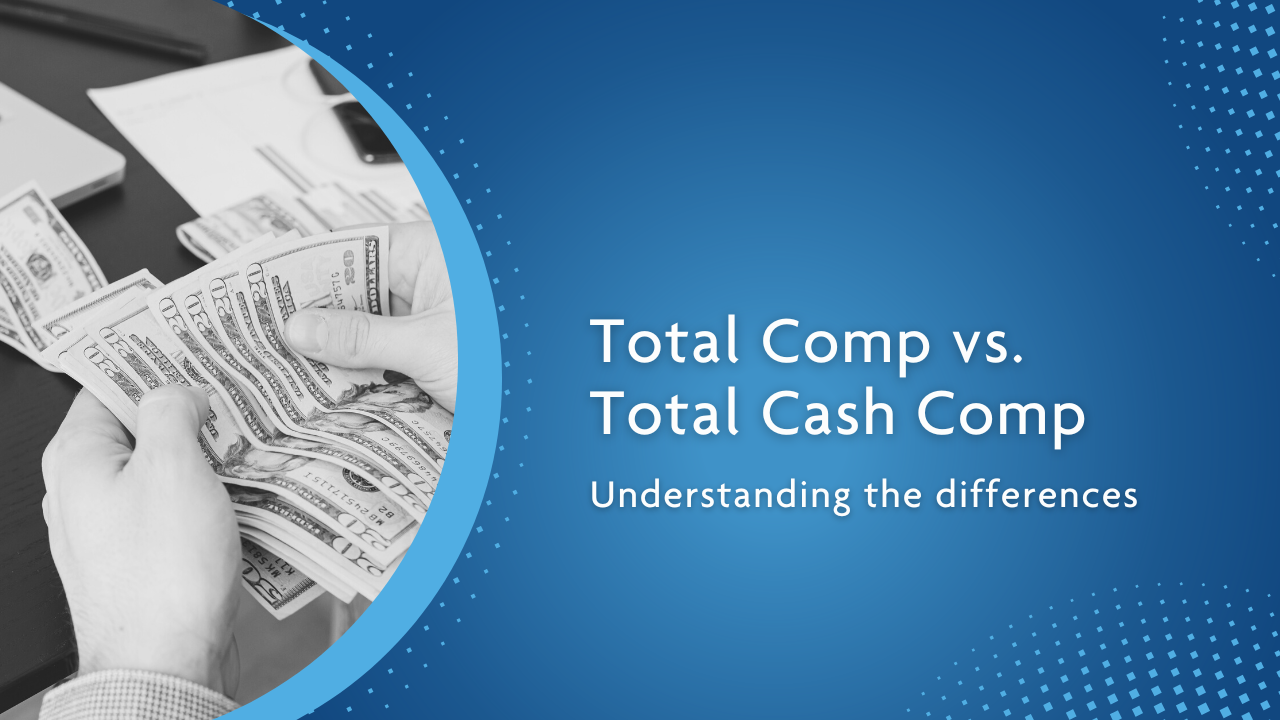As strong demand for qualified workers continues to be a challenge for employers in 2023, compensation remains at the forefront for businesses trying to retain and recruit talent. Having a better understanding of compensation can ensure you spend your dollars wisely and are able to communicate the true value of your employees’ compensation with clarity.
The terms total compensation and total cash compensation are often used interchangeably, but they’re not exactly the same. Read on to learn about what makes them unique.
TOTAL COMPENSATION (sometimes called Total Rewards) includes not just cash payments, but also the value of all employee benefits and perquisites that can be quantified. For many organizations, the cost of benefits, including healthcare premiums, retirement plan contributions, and paid time off can easily amount to 30% – 35% of an employee’s salary. That means the total compensation for an employee making $100,000 would be $130,000 – $135,000.
Many employees don’t realize the value of their benefits and perquisites. One of the best ways to communicate this is to produce some type of benefit statement that shows their value. This information can be a real eye-opener!
TOTAL CASH COMPENSATION means just that – the total value of all cash payments. Many organizations use the terms total compensation when they really are referring to total cash compensation. Total cash compensation includes base salary, overtime payments, short term bonuses and incentives, commission payments to sales professionals, and long-term bonuses and incentives.
When you’re having conversations about compensation with your employees or recruiting new hires, it’s important to talk in terms of total cash compensation. That means that if the base salary for a position is $80,000, and the annual incentive opportunity is 25%, annual total cash compensation can be $100,00 or more.
The most common components of total cash compensation are:
Base Salary
For most employees in non-sales roles, the largest portion of their total cash compensation will be their base salary. The term base pay is often used interchangeably with base salary.
By definition, base salary is the amount paid by an employer in return for services performed by an employee before any additions (e. g. overtime payments) or deductions (e. g. taxes) are made. Base salary may be expressed in hourly, weekly, monthly, or annual terms.
Employees considered nonexempt under the terms of the Fair Labor Standards Act (FLSA) are most often paid base salary on an hourly basis, while those considered exempt under the FLSA are paid base salary on a weekly, monthly, or annual basis.
Recruiters and recruitment job sites often quote hourly base salaries for nonexempt positions and annual salaries for exempt positions.
Bonus Payment
A bonus is a payment made in addition to base salary. Bonus payments can be made to an individual employee, a group of employees, or all employees as a reward for past achievements. Bonuses are often awarded for achievement of some organizational milestone such as profit or achievement of other financial goals. Achievement of an organizational milestone generally means that all employees receive the bonus, which may be given as a flat dollar amount or a percentage of base salary.
Individual and group bonuses are also frequently given to recognize achievements. For example, an individual who performs the job duties of a colleague on disability leave might be granted a bonus for their work. Or a team might be given a bonus to recognize successful implementation of a new system.
Sign-on bonuses, referral bonuses, and spot bonuses are also common. They are generally awarded to individuals.
True bonuses are discretionary. That means that they are awarded solely at the discretion of the employer, rather than expected by the employee as payment for achievement of a specific goal or objective.
Holiday bonuses, often awarded following a successful year, are discretionary bonuses.
Incentive Payment
An incentive payment is also a payment made in addition to base salary. Unlike a bonus, an incentive payment is tied to the achievement of specific goals and objectives. These goals and objectives are predetermined and communicated in advance. Goals and objectives may be established at the organizational, group, or individual level.
Many executive, technical, and professional level positions offer incentive opportunities in addition to base salary. Depending on position and industry, incentive payments can often be 40% – 50% of base salary and in some situations actually exceed base salary.
An incentive payment is a nondiscretionary bonus. Payment is expected by the employee if stated goals and objectives are achieved.
The use of incentives is increasing. A 2021 World at Work survey reported that 76% of participants offered some type of annual incentive plan. Survey participants represented multiple industries and differing jobs.
Commission Payment
A commission payment is a payment made for completion of a sale or sales-related task. Commission payments may be made in addition to a base salary, or may be paid instead of a base salary.
Compensation for most sales positions includes a base salary plus commission payments. Some jobs, however, are typically paid 100% commission. These include real estate agents, travel agents, and insurance sales agents.
Commission payments are most frequently made to the salesperson who completes a sale. However, individuals in account executive, business development, and sales manager roles may receive commission payments as well. For example, a sales manager may receive a portion of their sales representatives’ sales as a commission payment or “override” for their role in the sales process.
In some organizations, sales specialists and customer service representatives may also receive commission payments to recognize their contributions to sales success.
It’s always a good time for salary planning! Affinity HR Group can help you develop a benefits statement to clearly communicate your employees’ total compensation. Connect with us at 877-660-6400 or [email protected] to get your organization on track with a customized strategy!
By Susan Palé, CCP, Vice President for Compensation





